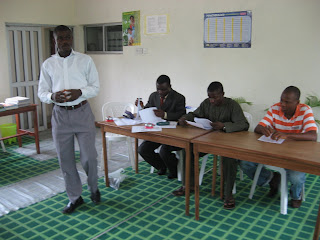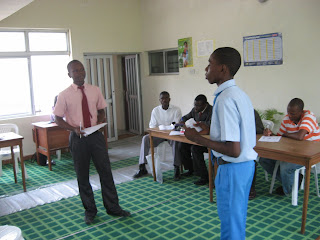 Students watching thier team in debate during debate championship
Students watching thier team in debate during debate championship














REPORT FOR TWO WEEKS DEBATE LEAGUE ORGANIZED BY DEBATE AND DEVELOPMENT RESOURCE CENTRE NIGERIA
6th-21st November 2007
The debate league started with one week orientation session for all the teachers and students from the participating schools. DEDERC trainers led by the Coordinator; Jerry Nwigwe, Franklin Ubi and Patrick Dodeye provided the participants with information on Karl Popper formats and role of speakers, Debate rules, Judging debates and other debate techniques and methodologies. This training was necessitated because so many schools don’t have debate clubs or they are not strong enough to participate in the tournament. Mock debates were later used to assess the readiness of the teachers and students to participate in the 2 weeks long exercise. The debate commenced with the preliminaries of which 16 schools were organized into groups of four each. And the topic for the first round was ‘Resolved that term limits for political office holders should be included in the Nigerian Constitution’. The winners and best runner –up progressed to the next round of eight. After the Second round draw was made, there were great excitement in the process because some strong debating schools were grouped against each other and they were set for battle royal; meaning one school will definitely go at the end of the day. Some schools like Hillcrest High School that had never lost debate contest in Cross River State were grouped with another powerful school; Unical International Secondary School. The debated on the topic Resolved that Immunity clause should be allowed in Nigeria constitution. All these topics tends to address local issues that is been debated by the general public looking at that moment. The winners of this knock out stage later went into another round, and this time on global debate topics/ issues. The first topics were on the best effective way to combat terrorism and also on global warming. On declaring the event open; the Coordinator of Debate And Development Resource Center Nigeria, Mr. Jerry Nwigwe welcomed all the participating schools and urged them to use this great opportunity to learn and interact with other students in a good atmosphere of debate. He later gave some insights on the benefits of debate to students, communities and the nation.
Following the debates there were several floor speeches when the motion was put to the floor;; the students’ audiences were allowed to discuss the topic and also to vote for the side that has done the best job. The students displayed an overwhelming enthusiasm for more events to be hosted in their school and also promised to carry on with the efforts to develop debating in their school. They also requested for education/ cultural exchange between Nigeria students and other students from all around the world.
The Finals of this debate has been shifted to next February, 2008 when the schools will resume. There was an imposition of one month vacation to students by Cross River State Government from 1st of December.
The Objectives for organizing this public debate are as follows:
· To strengthen debates in schools and public life
· To increase issue awareness on the minds of the youths
· To identify and prepare Nigerian representatives in International debate tournaments
· To strengthen existing teachers debate networks so as to recruit more teachers/members
· To introduce debates in schools that doesn’t have debate clubs
· To participate in the global debate on climatic changes
6th-21st November 2007
The debate league started with one week orientation session for all the teachers and students from the participating schools. DEDERC trainers led by the Coordinator; Jerry Nwigwe, Franklin Ubi and Patrick Dodeye provided the participants with information on Karl Popper formats and role of speakers, Debate rules, Judging debates and other debate techniques and methodologies. This training was necessitated because so many schools don’t have debate clubs or they are not strong enough to participate in the tournament. Mock debates were later used to assess the readiness of the teachers and students to participate in the 2 weeks long exercise. The debate commenced with the preliminaries of which 16 schools were organized into groups of four each. And the topic for the first round was ‘Resolved that term limits for political office holders should be included in the Nigerian Constitution’. The winners and best runner –up progressed to the next round of eight. After the Second round draw was made, there were great excitement in the process because some strong debating schools were grouped against each other and they were set for battle royal; meaning one school will definitely go at the end of the day. Some schools like Hillcrest High School that had never lost debate contest in Cross River State were grouped with another powerful school; Unical International Secondary School. The debated on the topic Resolved that Immunity clause should be allowed in Nigeria constitution. All these topics tends to address local issues that is been debated by the general public looking at that moment. The winners of this knock out stage later went into another round, and this time on global debate topics/ issues. The first topics were on the best effective way to combat terrorism and also on global warming. On declaring the event open; the Coordinator of Debate And Development Resource Center Nigeria, Mr. Jerry Nwigwe welcomed all the participating schools and urged them to use this great opportunity to learn and interact with other students in a good atmosphere of debate. He later gave some insights on the benefits of debate to students, communities and the nation.
Following the debates there were several floor speeches when the motion was put to the floor;; the students’ audiences were allowed to discuss the topic and also to vote for the side that has done the best job. The students displayed an overwhelming enthusiasm for more events to be hosted in their school and also promised to carry on with the efforts to develop debating in their school. They also requested for education/ cultural exchange between Nigeria students and other students from all around the world.
The Finals of this debate has been shifted to next February, 2008 when the schools will resume. There was an imposition of one month vacation to students by Cross River State Government from 1st of December.
The Objectives for organizing this public debate are as follows:
· To strengthen debates in schools and public life
· To increase issue awareness on the minds of the youths
· To identify and prepare Nigerian representatives in International debate tournaments
· To strengthen existing teachers debate networks so as to recruit more teachers/members
· To introduce debates in schools that doesn’t have debate clubs
· To participate in the global debate on climatic changes





